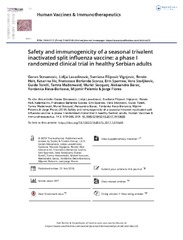Prikaz osnovnih podataka o dokumentu
Safety and immunogenicity of a seasonal trivalent inactivated split influenza vaccine: a phase I randomized clinical trial in healthy Serbian adults
| dc.creator | Stevanović, Goran | |
| dc.creator | Lavadinović, Lidija | |
| dc.creator | Filipović-Vignjević, Svetlana | |
| dc.creator | Holt, Renee | |
| dc.creator | Ilić, Katarina | |
| dc.creator | Scorza, Francesco Berlanda | |
| dc.creator | Sparrow, Erin | |
| dc.creator | Stoiljković, Vera | |
| dc.creator | Torelli, Guido | |
| dc.creator | Madenwald, Tamra | |
| dc.creator | Socquet, Muriel | |
| dc.creator | Barac, Aleksandra | |
| dc.creator | Ilieva-Borisova, Yordanka | |
| dc.creator | Pelemiš, Mijomir | |
| dc.creator | Flores, Jorge | |
| dc.date.accessioned | 2021-02-18T10:50:24Z | |
| dc.date.available | 2021-02-18T10:50:24Z | |
| dc.date.issued | 2018 | |
| dc.identifier.issn | 2164-5515 | |
| dc.identifier.uri | http://intor.torlakinstitut.com/handle/123456789/517 | |
| dc.description.abstract | This study was a phase I double-blind, randomized, placebo-controlled trial to evaluate the safety and immunogenicity of a Serbian-produced seasonal trivalent split, inactivated influenza vaccine in healthy adults. The vaccine was manufactured in eggs by the Torlak Institute of Virology, Vaccines and Sera, Belgrade, Serbia and contained A/H1N1, A/H3N2 and B viruses. The clinical trial took place at the Clinical Center of Serbia in Belgrade. Sixty healthy volunteers, aged 18-45years, were enrolled in the trial. On the day of immunization, volunteers were randomly assigned to receive either a single dose of the trivalent seasonal influenza vaccine (15g of hemagglutinin per strain) or placebo (phosphate-buffered saline). Subjects were monitored for adverse events through a clinical history and physical examination, and blood was taken for testing at screening and on day 8 to assess vaccine safety. Serum samples obtained before and 21days after immunization were tested for influenza antibody titers using hemagglutination-inhibition (HAI) and microneutralization (MN) tests. No serious adverse events were reported. Pain and tenderness at the injection site were the most commonly reported symptoms in both vaccine and placebo groups. Overall, serum HAI responses of fourfold or greater magnitude were observed to H1, H3, and B antigen in 80%, 75%, and 70% of subjects, respectively. Seroprotection rates as measured by HAI were also high (100%, 100% and 86.67%, respectively, for H1, H3 and B). Thus, Torlak's seasonal trivalent influenza vaccine was not associated with adverse events, was well-tolerated and immunogenic. It should be further evaluated in clinical trials to provide sufficient safety and immunogenicity data for licensing in Serbia. | en |
| dc.publisher | Taylor & Francis Inc, Philadelphia | |
| dc.relation | US Department of Health and Human Services/BARDA [IDSEP130015-01, IDSEP130018-01-06] | |
| dc.rights | openAccess | |
| dc.source | Human Vaccines & Immunotherapeutics | |
| dc.subject | Seasonal influenza vaccine | en |
| dc.subject | trivalent inactivated split | en |
| dc.subject | clinical trial | en |
| dc.subject | Serbia | en |
| dc.subject | Torlak | en |
| dc.title | Safety and immunogenicity of a seasonal trivalent inactivated split influenza vaccine: a phase I randomized clinical trial in healthy Serbian adults | en |
| dc.type | article | |
| dc.rights.license | ARR | |
| dc.citation.epage | 586 | |
| dc.citation.issue | 3 | |
| dc.citation.other | 14(3): 579-586 | |
| dc.citation.rank | M22 | |
| dc.citation.spage | 579 | |
| dc.citation.volume | 14 | |
| dc.identifier.doi | 10.1080/21645515.2017.1415683 | |
| dc.identifier.fulltext | http://intor.torlakinstitut.com/bitstream/id/336/514.pdf | |
| dc.identifier.pmid | 29239682 | |
| dc.identifier.scopus | 2-s2.0-85042401465 | |
| dc.identifier.wos | 000428053800021 | |
| dc.type.version | publishedVersion |

